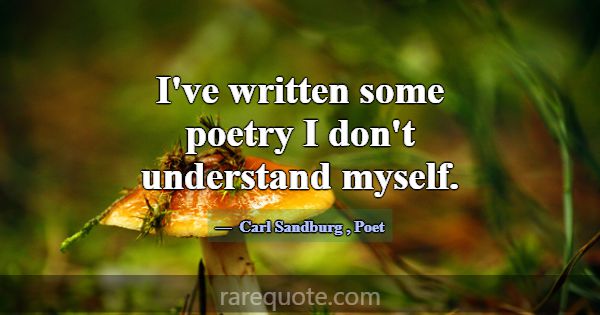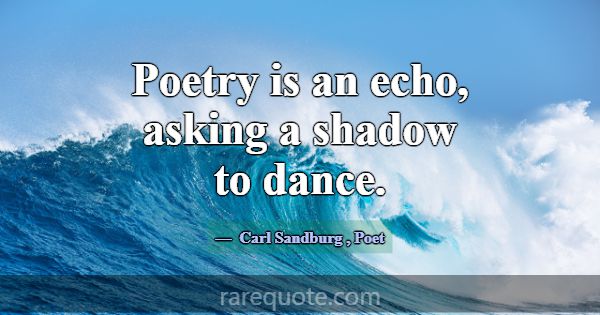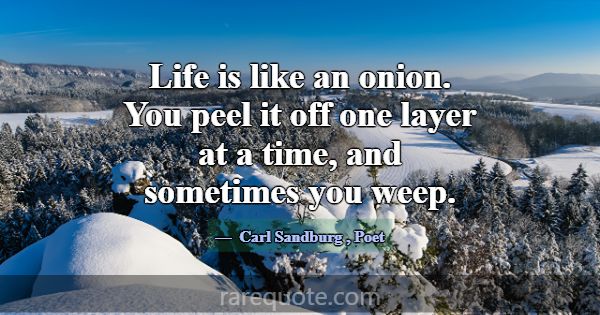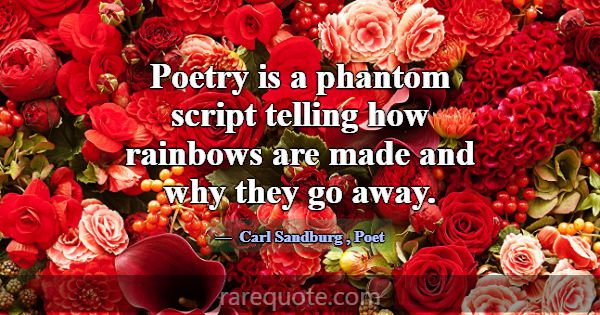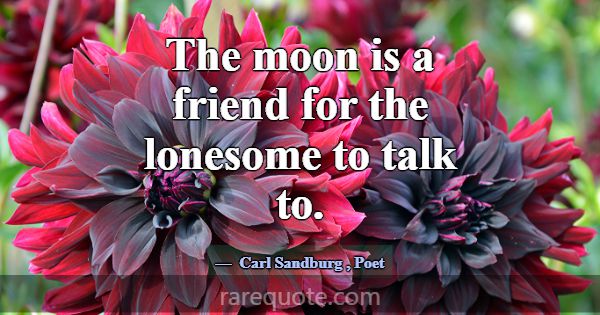Carl Sandburg Quotes
Carl Sandburg was an American poet, writer, and editor. He is best known for his poetry collections, such as "Chicago Poems" and "Cornhuskers," which captured the spirit of American life and celebrated the working class. Sandburg's poems often reflected social and political issues of his time, and his distinctive free verse style and use of vernacular language made his poetry accessible and relatable. His contributions to American literature have earned him recognition and acclaim. Sandburg's poetry continues to resonate with readers and evoke the spirit of the American experience.
This quote humorously reflects the enigmatic or elusive nature of some of the speaker's own poetry, suggesting that there are instances where the meaning or intention behind their poetic creations remains unclear or elusive even to the poet themselves.
This quote employs metaphorical language to describe poetry as an echo, symbolizing the reflection or reverberation of thoughts, feelings, or experiences. It suggests that poetry engages with elusive or intangible aspects, represented by the "shadow," and invites them to come alive or be expressed through the dance of words.
This quote speculates about a future in which the prospect of war fails to attract participants or supporters. It implies a scenario where people refuse to engage in armed conflict, suggesting a collective rejection of violence and a desire for peaceful resolutions. It reflects the possibility of a warless future.
This quote suggests that poetry combines the beauty and elegance of hyacinths (flowers) with the comfort and satisfaction of biscuits (food). It implies that poetry is a harmonious blend of aesthetic pleasure and emotional nourishment.
This quote expresses a realization that the judgment or opinions of close friends may not always be reliable or trustworthy. It suggests a recognition of the potential biases, subjectivity, or limitations in the perspectives of trusted friends. The quote implies a need for critical evaluation and independent thinking, even when seeking advice or guidance from trusted individuals.
This quote reflects on the surprises and serendipitous moments that lead to the best experiences in life. It implies that many of life's most cherished and meaningful moments are not premeditated or deliberately sought after but instead come unexpectedly, adding a touch of magic and wonder to life's journey.
This quote highlights the importance of resilience and the ability to learn from failure or defeat. It suggests that being a gracious loser, accepting setbacks with dignity and a positive attitude, enables one to grow and eventually achieve success. It implies that resilience, sportsmanship, and the willingness to learn from mistakes are key attributes in the path toward victory or personal development.
This quote uses metaphorical language to describe poetry as an ethereal or intangible script that conveys the origins and transient nature of rainbows, suggesting that poetry has the ability to explore the mysteries and transient aspects of life and nature.
This quote metaphorically portrays the moon as a companion or confidant for those feeling lonely or in solitude, suggesting that gazing at the moon or contemplating its presence provides solace or comfort for the lonesome.
This quote suggests that the existence of babies represents God's affirmation or declaration that life should continue. It implies that the birth of a child is a profound expression of hope and continuation.
Popular Topic
- Age
- Alone
- Amazing
- Anger
- Anniversary
- Architecture
- Art
- Attitude
- Beauty
- Best
- Birthday
- Brainy
- Business
- Car
- Chance
- Change
- Christmas
- Communication
- Computers
- Cool
- Courage
- Dad
- Dating
- Death
- Design
- Diet
- Dreams
- Easter
- Education
- Environmental
- Equality
- Experience
- Failure
- Faith
- Family
- Famous
- Father's Day
- Fear
- Finance
- Fitness
- Food
- Forgiveness
- Freedom
- Friendship
- Funny
- Future
- Gardening
- God
- Good
- Government
- Graduation
- Great
- Happiness
- Health
- History
- Home
- Hope
- Humor
- Imagination
- Independence
- Inspirational
- Intelligence
- Jealousy
- Knowledge
- Leadership
- Learning
- Legal
- Life
- Love
- Marriage
- Medical
- Memorial Day
- Men
- Mom
- Money
- Morning
- Mother's Day
- Motivational
- Movies
- Moving On
- Music
- Nature
- New Year's
- Parenting
- Patience
- Patriotism
- Peace
- Pet
- Poetry
- Politics
- Positive
- Power
- Relationship
- Religion
- Respect
- Romantic
- Sad
- Saint Patrick's Day
- Science
- Smile
- Society
- Space
- Sports
- Strength
- Success
- Sympathy
- Teacher
- Technology
- Teen
- Thankful
- Thanksgiving
- Time
- Travel
- Trust
- Truth
- Valentine's Day
- Veterans Day
- War
- Wedding
- Wisdom
- Women
- Work
